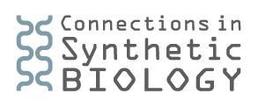Workshop 30th September 2010 8 a.m. Chilworth Manor, Southampton
Connections in Synthetic Biology (Southampton)
- Web page
- http://www.rsc.org/Membership/Networking/InterestGroups/ChemicalBiologyInterfaceDivision/SyntheticBiology.asp
- Categories
- Agents, Complex fluids, Developmental Biology, e-Research, Molecular Dynamics, Surface imaging, Tribology
- Submitter
- Petrina Butler
The University of Southampton, in association with the Royal Society of Chemistry and NESTA (National Endowment for Science, Technology and the Arts) is hosting a non-residential workshop programme to spark innovation in synthetic biology and bring new researchers to the field.
Synthetic biology holds great promise for tackling many of humanity’s problems. It demands input from many disciplines, including biology, chemistry, engineering, and social sciences.
The closing date for applications is 27 August 2010.
Objectives
The workshop aims to:
- Help researchers form lasting collaborations and professional relationships with peers from other disciplines
- Break down barriers to interdisciplinary work
- Bring new researchers, particularly chemists, into the field of synthetic biology
- Result in the production of synthetic biology research proposals
The Connections in Synthetic Biology programme has already run successfully at two other British universities: Imperial College, London and the University of Edinburgh. The workshops are delivered by SciConnect Ltd.
Format
The workshop takes place over two days at Chilworth Manor, attended by about thirty delegates from a diverse range of fields, including engineering, biology, chemistry, physics, social sciences, art and design, computing and mathematics.
The programme will include a mix of exercises, presentations, discussion and brainstorming sessions to encourage the development of new cross-disciplinary ideas. There will be plenty of opportunity to develop ideas with potential collaborators.
After the workshop, delegates will be able to keep in touch with each other and develop their ideas via the MyRSC online social network. This workshop will focus on developing ideas into concrete research proposals that could be submitted to research councils and other funding bodies. Participants will be invited to submit their proposals into a competition to win a seed-funding prize.
Seed Funding Prize
A prize of £10,000 will be awarded to the team which, in the opinion of the judges, produces the most original, innovative and sustainable project proposal involving researchers from two or more disciplines. The judges will be particularly interested in unusual collaborations between disciplines that do not normally work together.
The seed funding prize is intended to allow a team to conduct preliminary or proof-of-principle work to strengthen a subsequent project proposal to a research council or other funding body.
Eligibility
Academics need to be in a position to submit grant proposals to funding bodies. Therefore, applications are restricted to researchers who have reached postdoc level or above. Only researchers working for the University of Southampton and Winchester School of Art are eligible to apply.
Although researchers already working in the field of synthetic biology are welcome at the workshops, applications are particularly encouraged from researchers who have no, or only limited experience of the field. Chemists in particular are encouraged to apply.
Participants need to be able to take part in both days of the workshop.
Application
To apply, please download the short application form here, complete and email it to Dr Ellen Friel at the Royal Society of Chemistry by 27th August 2010.
No applications will be considered after this closing date.
Downloadable Files
Connections in Synthetic Biology Workshop Application Form Return by 27 August 2010
Contact and Further Information
Dr Ellen Friel Programme Manager, Life Sciences Royal Society of Chemistry, Thomas Graham House, Science Park, Milton Road, Cambridge CB4 0WF Tel: +44 (0) 1223 432440 Contact: Dr Ellen Friel
